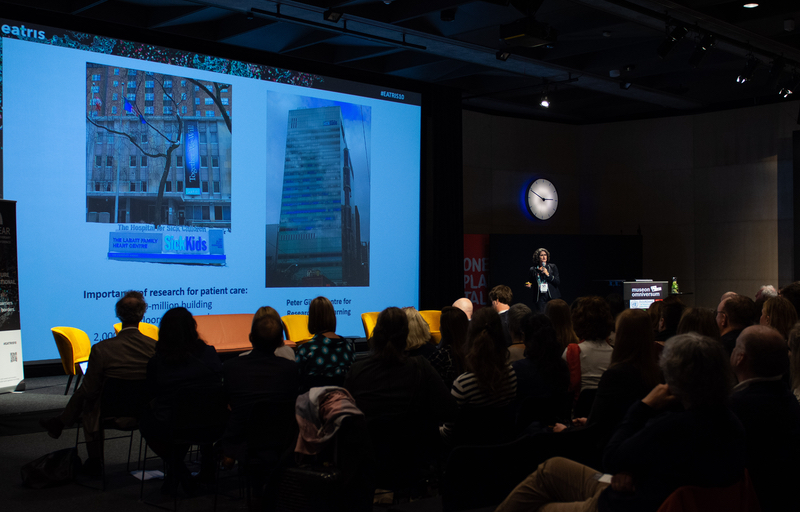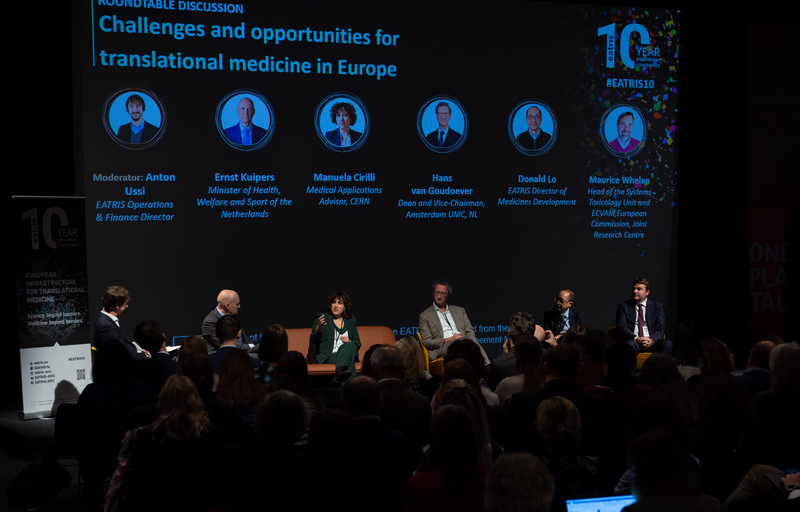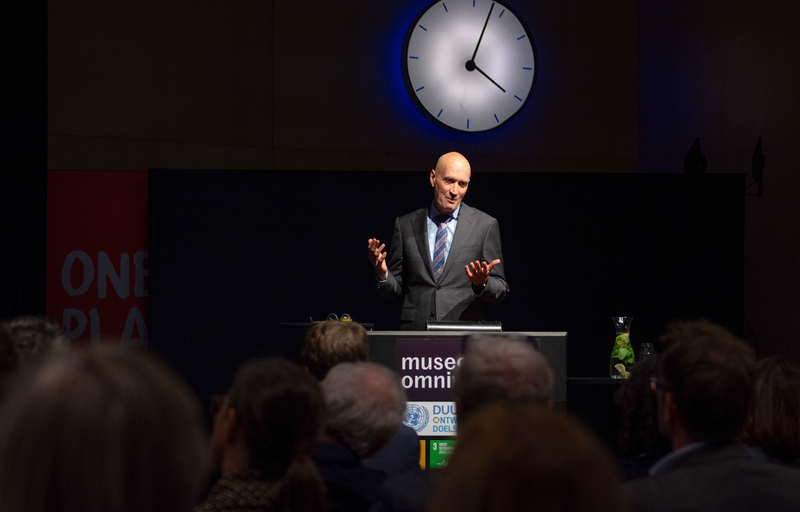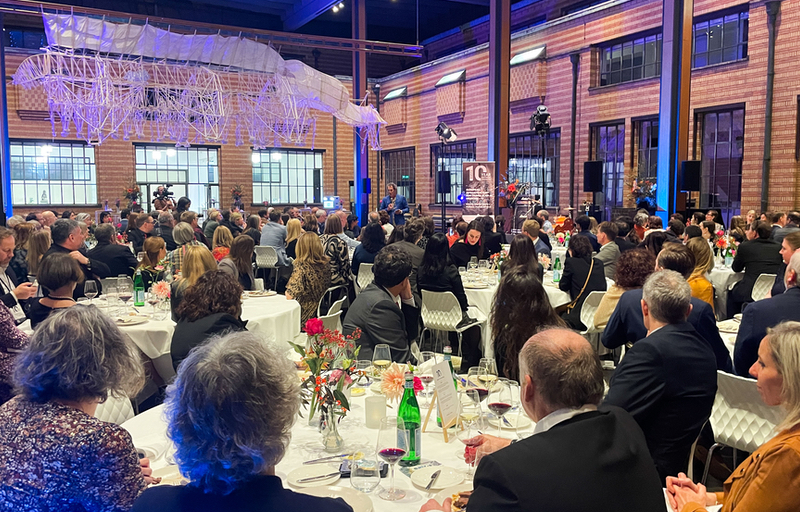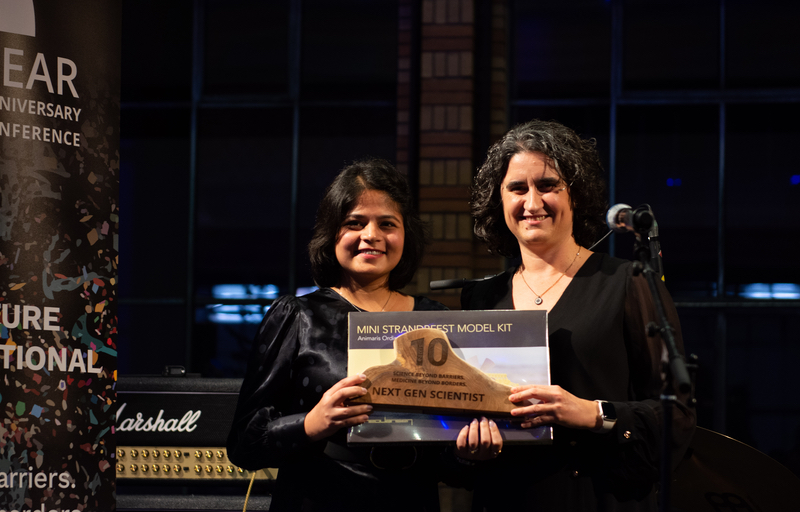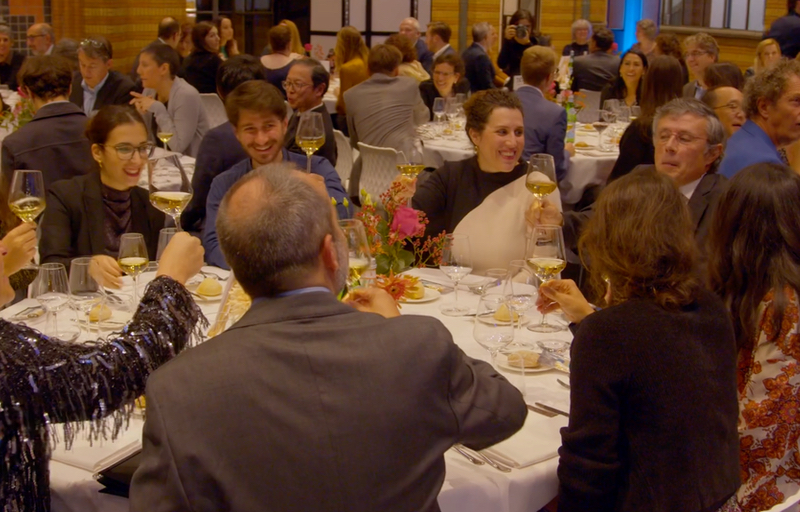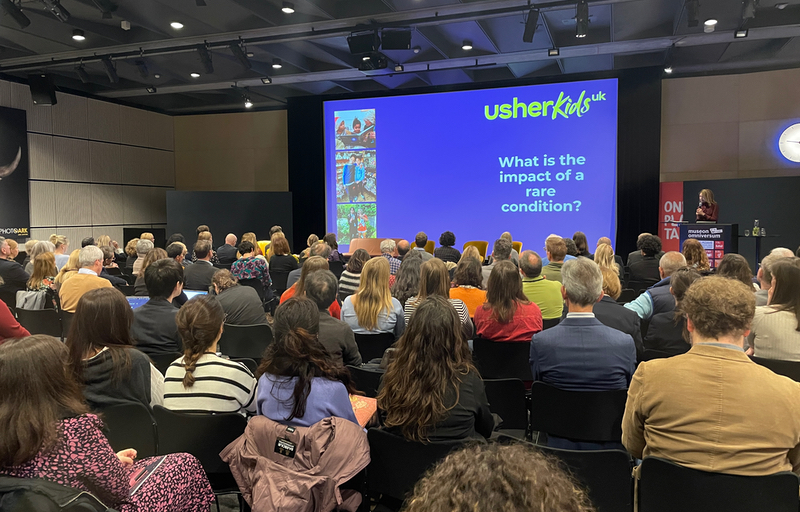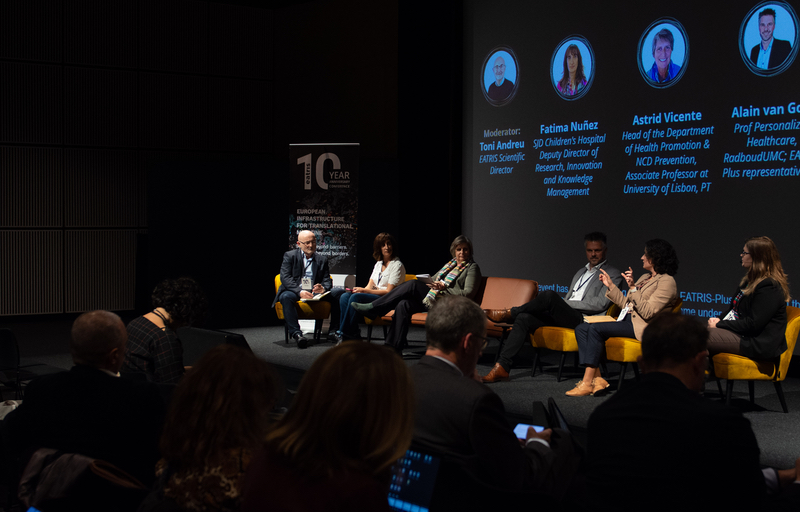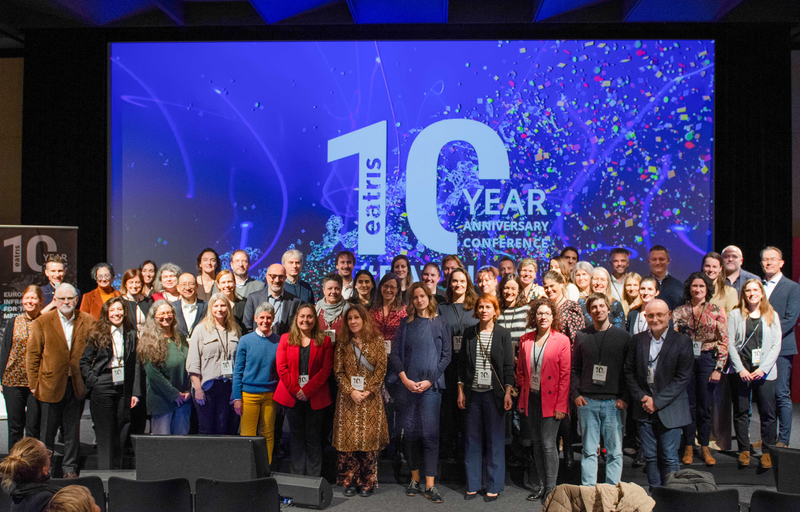EATRIS marked its 10th anniversary with a two-day celebration at the Museon-Omniversum in The Hague. The event united over 200 attendees from the global translational medicine community, from parliamentary ministers to patient advocates to particle physicists. The occasion gave an opportunity for the community to discuss how EATRIS can continue to reshape the way healthcare is delivered to society.
Celebrating a Decade of Translational Research
The conference featured four sessions that explored translational medicine from diverse perspectives. Sessions delved into the potential of translational medicine from a policy perspective; the need to embrace patient engagement as the new normal; approaches for bridging the innovation gap; and the transformative power of Personalised Medicine.
A Glimpse into the Future of Healthcare
The first day commenced with a captivating line-up of speakers, including a keynote address from Maria Coelho de Faria (Biobanco-iMM Founder and Co-director, Chair of Board of National Directors & National Director of Portugal), a community perspective from Jelena Ilić-Dreven (Co-Chair of the EATRIS Board of Governors; Directorate for Science and Technology, Ministry of Science and Education, Republic of Croatia) and a speech from Ernst Kuipers (Minister of Health, Welfare and Sport of the Netherlands).
A thought-provoking roundtable discussion, chaired by Anton Ussi (EATRIS Operations & Finance Director), then provided a comprehensive view of the challenges and opportunities in translational medicine. The panel included Manuela Cirilli (CERN Medical Applications Advisor), Hans van Goudoever (Dean of Medicine, University of Amsterdam and Vice-Chairman, Amsterdam UMC), Ernst Kuipers (Minister of Health, Welfare and Sport of the Netherlands), Don Lo (EATRIS Director of Medicines Development) and Maurice Whelan (Head of Systems Toxicology Unit and ECVAM, European Commission, Joint Research Centre).
Dinner of the Decade
The day ended with the “Dinner of the Decade” at the stunning Kunstmuseum (Museum for Modern Art in The Hague). It was a celebration that included live music, awards, and speeches that further cemented the sense of community in the translational medicine ecosystem that has been built over the past decade.
We cooked something very special for the occasion. Rosan Vegter (EATRIS Senior Rare Diseases Community Manager) worked creating a unique cookie for each attendee based on the five EATRIS scientific platforms. Find out more here.
The inaugural EATRIS Next Gen Scientist Award is a special recognition for an early career translational researcher who has shown creativity, passion, and innovation in their work. The Next Gen Scientist Award is not your typical science award. It is not based on the number of publications, citations, or impact factors. It is based on the ability to communicate your research and its translational potential in a fun, inspiring, or unconventional way. Whether it is through a dance, a poem, or a a comic. The winner – Anuja Lipsa – was announced by Dr. Prof. Claudia Maria Coelho de Faria (EATRIS Chair of the Board of National Directors) and Eliis Keidong (EATRIS Member Engagement Officer). Anuja Lipsa is part of the NORLUX laboratory in the Department of Cancer Research in the Luxembourg Institute of Health Anuja’s postdoc research on glioblastoma focuses on conducting a large-scale drug screen using tumour cells isolated from patient-derived xenograft models. This unique multi-parametric approach may set the foundation for early-phase personalised omics-based precision treatment strategies that could eventually be translated to clinic.
Additionally, the EATRIS Longevity Commitment award was presented to Ulrika Backmann (National Coordinator of Sweden) by Jelena Ilić-Dreven for her commitment and being a driving force in the Swedish translational community with a special mention to fostering relationships with biotechs and SMEs. Håkan Billig was also presented with “Special Recognition” by Anton Ussi, and Florence Bietrix presented the “Spirit of EATRIS” to Frank de Man and Giovanni Migliaccio.
Embracing Patient Engagement
The second day kicked off with an engaging session on the theme of patient engagement becoming the new norm. Chloe Joyner (Founder of Usher Kids UK) gave a powerful keynote before a roundtable discussion took place on why and how patients should be embedded in translational research, and what the added value of patient engagement is. Moderator Maria Dutarte (EUPATI Executive Director of the European Patients’ Academy) skilfully steered the conversation to highlight how patient advocates and academic researchers are already making patient engagement the new normal and explored ways to make further progress in this area of responsible research.
Panellists represented academia (Stan Van De Graaf Professor in Experimental Hepatology and Metabolism of the Amsterdam UMC; Head of the Tytgat Institute for Liver and Intestinal Research), patient organisations (Valentina Strammiello; European Patients’ Forum Director of Programmes), patient advocates (Larissa De Lannoy), research funding organisations (Monika Frenzel; International coordinator, French National Research Agency and European Partnership for Personalised Medicine) and research and innovation (Valery Dassen; Brain Foundation Programme manager).
Bridging the Innovation Gap in Translational Medicine
Next was the session on “Bridging the Innovation Gap in Translational Medicine” starting with a keynote on “Building a translational ecosystem” from Christopher Baum (Chairman of the Board of Directors of the BIH at Charité and Chief Translational Research Officer of Charité-Universitätsmedizin Berlin). The subsequent discussions provided a panoramic view of the current landscape and the imperative need for collaborative initiatives to transcend obstacles. Co-moderated by Montserrat Daban (Biocat Director of Strategic Foresight and International Relations) and Martin de Kort (EATRIS Senior Scientific Programme Manager), the panel convened experts to delve into multidimensional aspects critical to advancing translational research.
Panelists included Corne Baatenburg de Jong (ReumaNederland Adjunct Director), who offered insights on systemic bottlenecks impacting research feasibility. Daria Julkowska (EJP RD Scientific Coordinator), shed light on the European Joint Programme on Rare Diseases (EJP RD), emphasising its role as a catalyst for innovative directions. Cecile Ollivier (C-Path Europe Managing Director) highlighted sustainable solutions for researchers and innovators amid regulatory complexities. Additionally, Lars Schlotawa (Consultant for paediatrics, child neurology and metabolic medicine at the University Medical Centre Goettingen), contributed expertise on exploiting research potential for patient impact. The session encompassed a comprehensive exploration of multistakeholder collaborations, policy implications, incentives, and rare diseases as drivers for innovation, reaffirming the imperative for robust strategies in translational medicine.
Personalised Medicine – The Future Is Now
The final session covered “Personalised Medicine – The Future Is Now”. Following a keynote from Ivo G. Gut (Director of Centro Nacional de Analisis Genomico, Barcelona), the discussion illuminated the complexities and promises inherent in this transformative realm. Under the moderation of Toni Andreu (EATRIS Scientific Director), the panel explored the challenges and milestones towards the widespread implementation of Personalised Medicine.
Panelists included Claudia Maria Coelho de Faria (Biobanco-iMM Founder and Co-director), whose insights emphasised the need for collaborative governance for impactful implementation. Ewa Ellis (Laboratory Director at the unit for transplantation surgery, Karolinska Institutet) delved into tools and methodologies required for inclusivity in healthcare advancements. Alain van Gool (Professor in Personalised Healthcare at Radboud University Medical Center and EATRIS-Plus representative) shed light on the industry’s role in reshaping processes for widespread adoption. Additionally, Fátima Núñez (Deputy Director of Research, Innovation, and Knowledge Management at Hospital Sant Joan de Deu Barcelona) and Astrid Vicente (Head of Department of Health Promotion and NCD Prevention at the University of Lisbon) contributed valuable insights on cultural readiness and the convergence of diverse stakeholders in realizing the promise of Personalised Medicine.
The session served as a platform to contemplate the challenges and opportunities in turning the vision of Personalised Medicine into a tangible reality, urging collaboration across sectors for profound systemic change in healthcare delivery.
Reflecting on a Decade of Collaboration and Vision
In their closing remarks, Anton Ussi (EATRIS Operations & Finance Director) and Toni Andreu (EATRIS Scientific Director) highlighted the collaborative spirit that has propelled EATRIS over the past decade. They expressed gratitude to the scientific community, policymakers, and supporters whose dedication has positioned EATRIS as a pioneering force in European biomedical research.
A Shared Vision for the Future
The event underscored the collective commitment to reshape healthcare, where scientific advancements merge seamlessly with patient-centric approaches. Participants expressed determination to continue collaborating across borders, embracing innovation, and working shoulder-to-shoulder with patients on this journey.
EATRIS extends heartfelt appreciation to the European Commission, Member States, Board of Governors, and all of our community for their unwavering support and partnership.
The 10-year anniversary event stands as a testament to EATRIS’s dedication to catalysing transformative change in healthcare, fostering a shared vision to tackle the evolving challenges of modern medicine.
Bring on the next 10 years, and beyond!
- View event photos here.
- View event page here, including the full programme.
- The making of… EATRIS @10 celebration cookies.
About EATRIS
EATRIS is the European Infrastructure for Translational Medicine. It’s a non-profit organisation that brings together resources and services for research communities to translate scientific discoveries into benefits for patients. Users are given access to a vast array of expertise and facilities from over 150 top-tier academic centres across Europe. EATRIS focuses on improving and optimising preclinical and early clinical development of drugs, vaccines and diagnostics, and overcoming barriers to health innovation. Find out more about EATRIS here: www.eatris.eu
Connect with EATRIS
- Follow EATRIS on LinkedIn, X/Twitter, Facebook and YouTube. For highlights from the event, see the #EATRIS10 hashtag.
- Sign up to the EATRIS mailing list.

